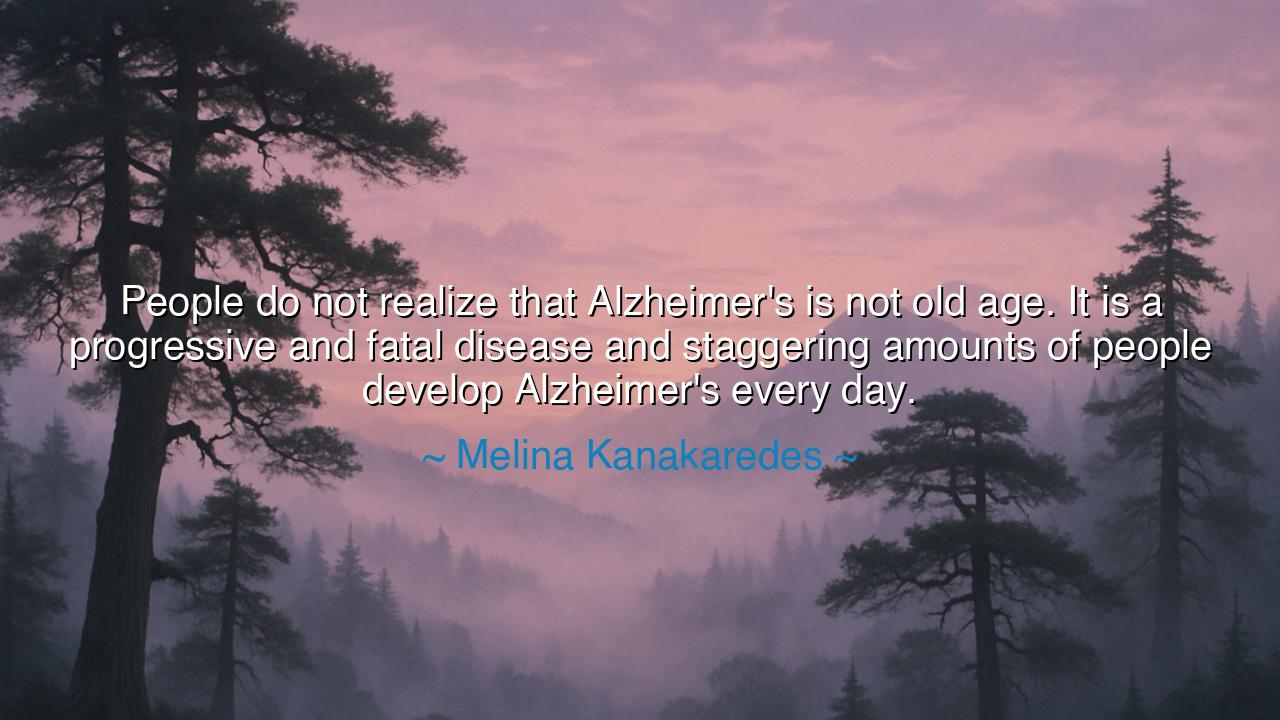
People do not realize that Alzheimer's is not old age. It is a
People do not realize that Alzheimer's is not old age. It is a progressive and fatal disease and staggering amounts of people develop Alzheimer's every day.






The words of Melina Kanakaredes—“People do not realize that Alzheimer's is not old age. It is a progressive and fatal disease and staggering amounts of people develop Alzheimer's every day.”—fall upon the heart like a solemn toll of truth, a reminder of the shadow that walks beside the light of human life. Her words pierce through misunderstanding and complacency, awakening us to the reality that Alzheimer’s is not a natural twilight of life’s journey, but a storm that steals memory, identity, and time itself. It is not the gentle fading of age, but the cruel unraveling of the self. In these words lies both a lament and a call—to awareness, to compassion, and to courage.
Melina Kanakaredes, an actress known for her grace and intelligence, has spoken often about the need for awareness of Alzheimer’s disease, a cause close to her heart. Her words are born not of abstraction but of witness—of watching the slow vanishing of the familiar in those afflicted, as their memories, once bright as constellations, dim one by one. Through her statement, she seeks to shatter the dangerous myth that Alzheimer’s is merely a symptom of old age, a natural decline to be accepted. No—she insists—it is a progressive and fatal disease, a thief that robs not only the mind but also the dignity of those who bear it, and it must be faced as such: with truth, research, and collective resolve.
The ancients, though they knew not this disease by name, understood the tragedy of forgetting. In Greek myth, there is the River Lethe, whose waters bring forgetfulness to souls entering the underworld. To drink from it is to lose one’s memories, one’s loves, one’s very self. It was said that the soul who drank too deeply from Lethe would no longer remember who they were, wandering forever in the dim fields of shadow. Alzheimer’s disease, in our own age, is a modern Lethe—a river that runs through the human mind, erasing the landscapes of life. Those afflicted do not choose to forget; they are carried helplessly by the current. Kanakaredes’s words urge us to see this not as fate, but as an enemy of humanity that must be understood, fought, and ultimately overcome.
Her statement, too, reminds us of the scale of this affliction. “Staggering amounts of people develop Alzheimer's every day,” she says—and indeed, it is a tide that grows with each generation. Around the world, millions of families watch their loved ones drift away, the eyes still bright but the recognition fading. This is not merely a personal tragedy; it is a societal one, demanding both empathy and action. The ancients taught that a civilization is judged not by its monuments or wealth, but by how it treats its weakest members. In this age, the measure of our wisdom will be found in how we respond to those who suffer from Alzheimer’s—whether we meet them with neglect or with understanding, with silence or with compassion.
To illustrate this, we may look to the story of Ronald Reagan, the former President of the United States, who in his later years faced the relentless advance of Alzheimer’s. In a letter written to the public in 1994, he announced his diagnosis, saying, “I now begin the journey that will lead me into the sunset of my life.” Those words—dignified, brave, and heartbreakingly aware—offered a window into the consciousness of one who knew he was slowly losing his own mind. Yet even as his memories began to fade, his courage illuminated the darkness. Reagan’s story, like that of countless others, stands as a testament to both the cruelty of the disease and the enduring nobility of the human spirit.
Melina Kanakaredes calls upon us not merely to mourn, but to act. Knowledge must replace ignorance, and compassion must replace indifference. She reminds us that to dismiss Alzheimer’s as “just old age” is to abandon those who suffer. The ancients believed that illness was not only a test of the body but of the soul—and that the duty of the healthy was to uplift the afflicted. In this spirit, we are called to support research, to care for caregivers, and to restore dignity to those who are slowly losing themselves. For though the disease may steal memory, it must never steal humanity.
Let this, then, be the teaching for our time: remember those who forget. See them not as fading shadows, but as living souls still worthy of tenderness and respect. Do not turn away from the difficult truth, but face it with courage and empathy. Learn, support, advocate, and give where you can. Above all, let us hold fast to the idea that love endures even when memory falters—that the heart remembers what the mind cannot.
In the end, Melina Kanakaredes’s words are more than a warning; they are a call to compassionate awareness. For though the mind may fall to silence, the echo of kindness remains eternal. If we, as a people, can learn to see Alzheimer’s not as an inevitable part of aging but as a battle to be fought with wisdom and love, then we will have honored not only those who suffer, but also the sacred gift of memory itself—the thread that binds all of humanity across the vast and fragile tapestry of time.






AAdministratorAdministrator
Welcome, honored guests. Please leave a comment, we will respond soon